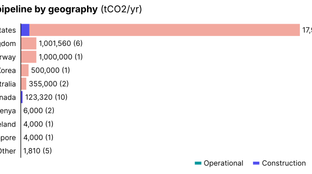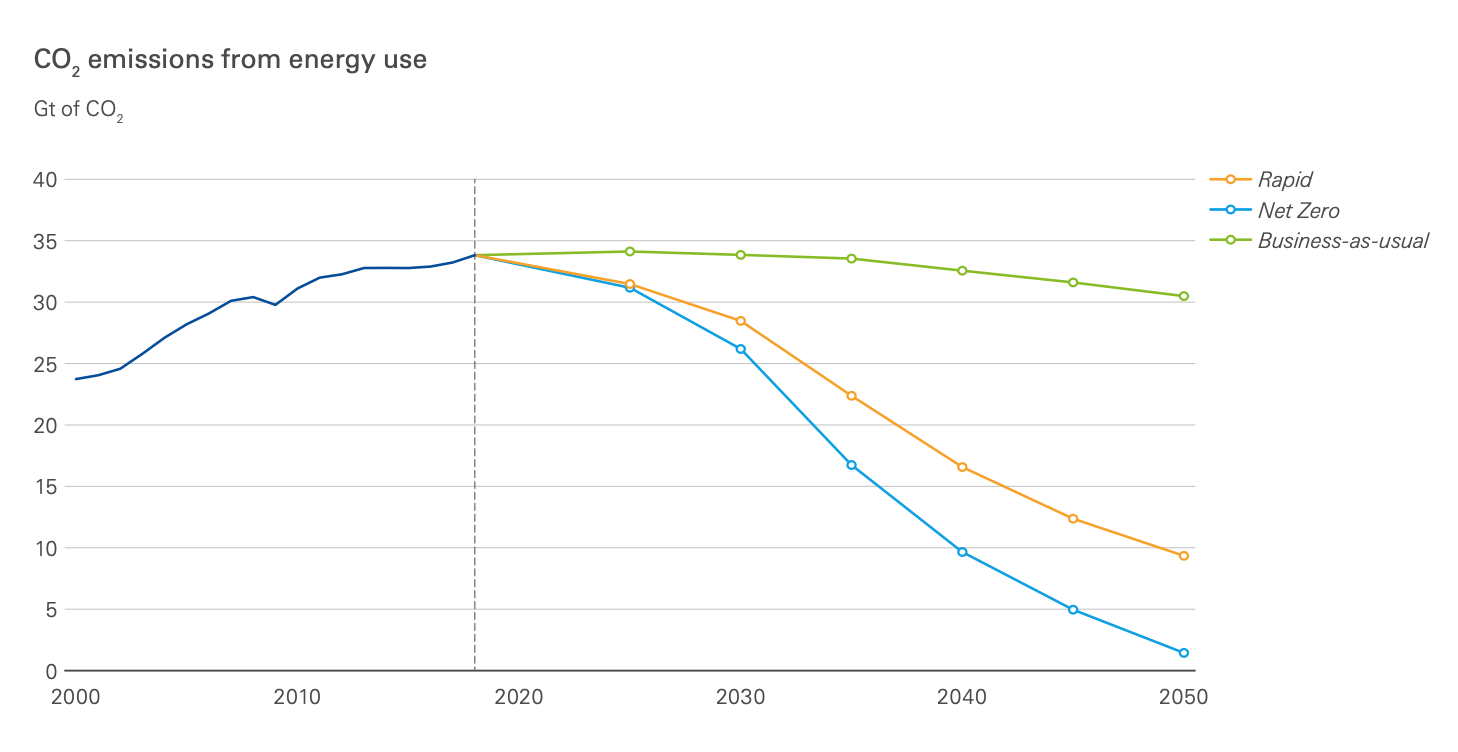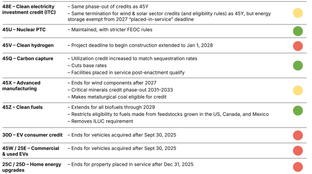
🌎 Taxing times for CCUS #254
OBBB blows tailwinds through CCUS, but takeoff stalls
The climate misinformation campaign and what the election has to do with it
As the market begins to price in more election-time jitters, we’re left to appreciate how much of a referendum on climate this election really is. As the Netflix docu-drama Social Dilemma makes clear, “in tech we trust” and that seems to be more and more the refrain as the government lags behind. Big tech and other corporates continue to lead with big pledges (Google, Facebook, Amazon, and Shopify) and real action to transform supply chains because it’s right for the planet and right for profit.
In this issue, we recap our most recent Clean Energy for Biden event, review the three primary mechanisms of climate misinformation, and chock the newsletter full of news, jobs, and fundings. Highlights this week include BP’s peak oil outlook, the new DER guidelines, Pachama’s raise backed by Amazon’s Climate Pledge Fund, and a new crop of climate SPACs.
**For anyone involved in climate tech innovations related to the wildfires, please reach out – we’ve devoted next week’s issue to a more in-depth exploration.
Given this week’s news, it’s also worth reflecting that: “A court ought not be affected by the weather of the day, but will be by the climate of the era.” - Ruth Bader Ginsburg. RIP, Notorious RBG.
Thanks for reading!
Not a subscriber yet?
On Thursday, a group of climate tech investors got together for a conversation about how a Biden-Harris administration could shape the climate tech investment landscape. TL;DR this election (unsurprisingly) will have far reaching climate consequences, and much of the growth in climate innovation has come from corporates against (rather than with) policy.
A few interesting notes:
🌱 Infarm, a Berlin, Germany-based vertical farming startup, raised $170m in a “first close” of Series C funding from LGT Lightstone, Hanaco, Bonnier, Haniel, and Latitude. TechCrunch has more here.
🚲 VanMoof, a Dutch e-bike startup, raised $40m in Series B funding from Norwest Venture Partners, Felix Capital, and Balderton Capital. TechCrunch has more here.
💨 GHGSat, a Montreal, Canada-based greenhouse gas monitoring company, raised $30m in Series B funding from Government of Québec’s Investissement Québec, OGCI Climate Investments, and others. More here.
🍄Meati Foods, a Boulder, CO-based producer of fungi-based meats previously known as Emergy, raised $28m in Series A funding from 44 investors. More here.
🌱 Brightseed, a San Francisco, CA-based startup using AI to identify specific plant nutrients believed to boost human health, raised $27m in growth financing from Lewis & Clark AgriFood. TechCrunch has more here.
☀️ Zolar, a Berlin, Germany-based developer of solar panel systems for consumers, raised $18m in Series B funding from Czech VC Inven Capital, TS Ventures, Heartcore Capital, and others. More here.
🌱 Dendra Systems, a New York-based ecosystem restoration company, raised $10m in funding from At One Ventures, Airbus Ventures, Future Positive Capital, and Lowercarbon Capital. More here.
🌲 Pachama, a San Francisco, CA-based AI driven forest carbon sequestration startup, raised $5m from Breakthrough Energy Ventures led and the Amazon Climate Pledge Fund. TechCrunch has more here.
🐜 Agragene, a San Diego, CA-based company developing environmentally conscious alternatives to chemical pesticides, raised $4m in Series A funding from Ospraie Ag Science. More here.
♻️ Circularise, a Netherlands-based blockchain plastics recycling startup, raised $1.8m through the EU’s Horizon 2020 program. More here.
☀️AMMP Technologies, an Amsterdam, Netherlands-based developer of remote renewable energy monitoring systems, raised $1.4m in Seed funding from Point Nine Capital, The Raba Partnership, and Musha Ventures. More here.
AEA-Bridges Impact Corp., an ESG-focused SPAC formed by AEA Investors and Bridges Fund Management, filed for a $400m IPO. More here.
Qell Acquisition, a sustainable tech-focused SPAC formed by PIMCO and led by Barry Engle (ex-president of GM North America), filed for a $300m IPO. More here.
ACON S2 Acquisition, a sustainable business-focused SPAC formed by ACON Investments, raised $250m in its IPO. More here.
Eos Energy Storage LLC , an Edison, NJ-based manufacturer of zinc hybrid cathode battery energy storage systems agreed to go public via a reverse merger with SPAC B. Riley Principal Merger Corp. II. More here.
XL Fleet, a Boston-based vehicle electrification company, agreed to go public via a reverse merger with SPAC Pivotal Investment Corporation II. More here.
Facebook announced last week that it has created a new Climate Science Information Center, essentially a separate climate news feed exclusively from verified sources. It is modeled after their recent campaign to separate true from false news with COVID-19 information.
The announcement follows some heat from the NYTimes criticizing Facebook’s recategorization of flagged false content as “opinion.” In particular, the climate denial nonprofit, CO2 Coalition, whose stated mission is to promulgate “the important contribution made by carbon dioxide to our lives and economy” is an outlier ‘opinion’ holder, and happens to be funded in large part by the Mercer Family Foundation and the Charles Koch Institute.
The creation of the Climate Science Information Center follows a similar trend (highlighted last week by a credible whistleblower) of Facebook’s use of ‘stunts’ to deflect taking meaningful action on misinformation. As much as creating real news to dilute the fake is laudable, it seems more like applying a discount on misinformation rather than grappling with the intricacies of dispelling it entirely.
Misinformation in climate is a longstanding strategy, though it is uniquely exacerbated by social media that rewards the sensational over the factual.
ExxonMobil infamously investigated climate change as early as the 1970s and after Dr. James Hansen’s 1988 Congressional testimony on the dangers of global warming, began a disinformation campaign. Today, the climate countermovement subverts industries well beyond oil & gas majors to include utilities and railroads.
The network of opposition uses three primary mechanisms to spread climate disinformation:
1. Charitable giving: donations to prominent institutions of higher education, think tanks, and political campaigns tilt the hand of these information vectors towards climate confusion.
2. Consumer marketing: clever campaigns like the concept of a “carbon footprint” export the burdens of climate action on consumers, not on the scope 1 and 2 producers themselves.
3. Bots: social platforms remain perhaps the richest ground to sow misinformation - a recent study from Brown University found that a staggering 25% percent of tweets about climate change are generated by bots propagating climate denial.
Arguments of methods and motivations aside, such misinformation campaigns actively slow progress on climate mitigation and adaptation and create barriers to fledging ventures’ narratives otherwise. Outside of bubbles (like this newsletter), climate denialism is alive and well - with wide-ranging implications for the election. Meanwhile, the Democratic party still refuses to include an end to fossil fuel subsidies in its platform given the potential industry maelstrom.
Though often invisible, this persistent torrent of climate misinformation significantly slows climate tech’s progress by pitting it as a politically moral prerogative, rather than a solution to glaring and real problems. The battle of perception is critical for climate tech growth, particularly in acknowledging that the field’s mandate starts at a disadvantage to the market whenever it has to explain what the market is.

BP: Have we finally reached peak oil demand? BP’s Energy Outlook outlines 3 growth scenarios in which oil demand peaks within the next decade (a first for an oil major to acknowledge). The report recognizes that “the energy system is likely to undergo a fundamental restructuring in order to decarbonize.” Similarly both the IEA and OPEC cut their oil demand forecasts for this year.
UtilityDive: The Federal Energy Regulatory Commission (FERC) passed the long-awaited FERC order 2222. Praised by solar, storage, and other clean energy advocates, the order lowers the hurdle for distributed-energy resources (DERs), like rooftop solar, to sell electricity in the wholesale market market. This policy also facilitates new market participants, like electric vehicles supplying to the bulk grid.
Amazon: Amazon announced its first investments out of the $2bn Climate Pledge Fund: CarbonCure Technologies (carbon removal through concrete), Pachama (verifying forest carbon offsets), Redwood Materials (recycling Lithium-ion batteries), Rivian (electric vehicles), and Turntide Technologies (energy efficient motor). Within the same week, Shopify also announced its $5m investment in breakthrough sustainability technologies including Carbon Engineering and Climeworks.
Google: Google joins an ambitious week of Big Tech environmental commitments by pledging to run its operations purely on carbon-free energy by 2030. It also announced that it has purchased enough carbon offsets to cancel out its emissions released since founding. Facebook jumps on the decarbonization bandwagon with its goal to reach net zero carbon emissions by 2030.
Financial Times: LG Chem is spinning off its electric vehicle battery division, capitalizing on the rapid growth of the battery industry. The EV battery unit is forecasted to generate more than $26bn of annual sales by 2024 and is already profitable.
APNews: Standing amidst the destruction caused by wildfires across the west, California’s Gov. Gavin Newsom told reporters that the current California clean energy targets of 100% zero-carbon by 2045 is inadequate. Newsom insisted that the goals need to be accelerated and pushed his administrators to explore new policies to achieve zero-carbon faster.
Time: Climate change impacts human behavior. For example, research has shown that warmer temperatures and extreme weather contribute to violent crimes, political and social instability, and the collapse of regimes. There is a strong scientific basis to assume that, without curbing emissions, we’re in store for many more years of disturbing news.
President Trump visited California after weeks of silence on the wildfires only to blame the crisis on poor forest management, not climate change.
Speaking of which - how much will the wildfires cost?
Check out the climate risk where you live with this interactive map or input your country into ProPublica’s new climate maps.
A German grocery store, Penny, is accounting for the “true cost” (i.e., the damage caused to the environment) of some products, doubling their prices.
Berlin government launched a state-run department store that both sells secondhand items and serves as an education center encouraging repair and reuse.
A researcher who rejects climate science was hired by NOAA for a senior position.
Tomorrow has created a dynamic map showing the climate impact of electricity.
Cloud Agronomics can quantify soil carbon content without ever touching the dirt.
The Swedes are building a wind-powered cargo ship. Sound familiar, Magellan?
💡 To get more PhDs into VC, our friends at Fifty Years VC are launching a free nights and weekends program calledPhD to VCto teach academics the lingo, economics, sourcing, etc. to get their foot in the door of venture. Apply here!
💡 Climatebase keeps on growing! The Climatebase Fellowship is a 10-week climate career accelerator for the next leaders in climate tech whether you’re looking to join a climate startup, find a cofounder, or gain a real-world education. Priority applications are due 9/22.
🗓️ 9/21-9/27 Climate Week NYC: Here is the full program of Climate Week NYC events.
🗓️ 9/22 Waste to Resources and the Circular Economy: Join to learn about the steps companies are taking to drive positive change towards the advancement of the circular economy.
🗓️ 9/23 Climate Tech’s Tipping Point: Tune in for a conversation that Sophie is moderating between a panel of (female) climate investors from Collaborative Fund, Buoyant Ventures, and Urban Us on the impacts of COVID-19 on the climate venture space.
🗓️ 9/23 Clean Energy for Biden on Climate Denial: Tune in for Prof. Naomi Oreskes and Rhode Island Sen. Sheldon Whitehouse’s discussion of the importance of the presidential election in addressing climate misinformation.
🗓️ 9/24 You Missed This: Tune in for “You Missed This! : Recap of Best New Ideas in Sustainable Finance.” Sophie will be saving listeners from climate tech FOMO, alongside experts sharing ideas on the future of hydrogen, carbon pricing, ethical deep sea mining, China’s role in climate, and hot takes on Project Drawdown drawbacks.
Venture Associate @AngelList
Head of Finance and Administration @Pale Blue Dot
Content Creator @Carbon Switch
Computational Biologist @Biobot Analytics
Bio+Tech Partner @Pillar VC
Chief Marketing Officer @Saildrone
Analyst / Associate, Investment Team @Generate Capital
Engineering Manager @Trove
Fermentation Engineer, Formulations Engineer @Kula Bio
Impact Project Manager @Planet
Feel free to send us new ideas, recent fundings, or general curiosities. Have a great week ahead!

OBBB blows tailwinds through CCUS, but takeoff stalls

One Big Beautiful Bill ushers in new (and old) energy agenda

Climate, capital, and carrots in London's new playbook